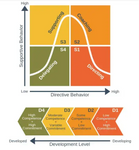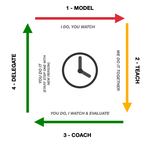Supervision Skills
Lesson 3: Case STudies
Lesson Objectives
- Identify when your supervisees need direction, coaching, support, or delegation.
- Practice discerning supervisees' needs.
Giving the correct support to your supervisee
In your regular formal supervision meetings and any informal supervision meetings, one of the biggest questions you will be determining is, “How can I help?” - How can I help them achieve a given goal or task? Whether you realize it or not, you adjust your leadership style according to the situation. You change your leadership style depending on the ability (competency) and the attitude (commitment) of your supervisee. Not one style is the best, but the best style is determined by the situation. You would treat a leader of 20 years differently than you would a leader of 1 year.
The Situational Leadership Model can help you diagnose a situation and determine the best kind of leadership for a situation. The Situational leadership model helps you know when you can delegate, support, coach, or direct.
When a team or supervisee needs help in a situation you need to determine two things:
- What is their competency level to achieve this goal or task?
- What is their commitment to this goal or task?
Once you know these two things, you can determine which leadership style is best:
- Delegating - The leader provides minimal direction and guidance. Leaders are more concerned with vision than the day-to-day.
- Supporting - leader participants in decision-making, but most decisions are made by the team. The leader might seem quiet.
- Coaching - leaders are receptive to input and feedback. Leaders “sell” ideas and plans to subordinates to obtain their cooperation. The leader coaches them through a problem or task.
- Directing - leaders make all decisions without consulting subordinates

How is this idea used?
To learn more about the Situational Leadership Model, watch the OPTIONAL video Situational Leadership Model Explained
This concept is very similar to the Learning Square idea that we learned in Year 1! Determining someone’s ability helps us know how to lead that person. See the learning square below to see the similarities.
If your supervision meetings are about helping the supervisees achieve their vision and goals, the Learning Square and Situational Leadership Model will help you determine how to help!

Pause and Reflect: Consider the Situational Leadership Model.
- Can you think of a time in your life when you used the wrong kind of leadership for a certain situation? What would you have done differently?
- Can you think of a time in your life when you used the correct kind of leadership for a certain situation? What made you choose that time of leadership for that situation?
On your divisional call, you will explore some case studies to practice using these skills.
More to Learn
Lastly, one very important skill all supervisors should know how to do is to have hard conversations. Hard conversations include: discussing when someone is not performing well in their role, someone is having a behavior or moral issue, and when someone is having a relational issue. This skill is so important that it will be one of the main topics in the Conflict Resolution section later in the year.
Action Items
- Come prepared to your divisional call to discuss the Situational Leadership Model and review some case studies.
- In your next supervision meeting, try using the Situational Leadership Model to determine how to best support your supervisee in an issue they share. Share your experience on your divisional call.
Supervision Case Studies - Practice
On your divisional calls you will use case studies to practice what you learned in these lessons. You can preview the Case Studies below
Case Study #1
You have just hired a new Area Director and are responsible for supervising this new AD. This leader has been a wonderful Young Life volunteer but has never been on staff with Young Life before. The AD is very excited to be on staff with Young Life and feels very strongly about their ability to help leaders improve in contact work, club, and camps by modeling it well, but during the hiring process, you have had some concerns they may not understand the full scope of the Area Director job.
What would you do?
How can you help them be equipped for the full role and help ensure they are fulfilling the job expectations?
- How to help them get trained in the role?
- Rhytym/expectations for first 3 months?
- Yearly supervision plan?
Case Study #2
You are responsible for supervising a Metro Director (this leader supervises multiple Area Directors) who has many years of experience in Young Life. This person is widely respected because of their long history in the ministry. They’ve been great at relational ministry with teenagers and leaders and have discipled other leaders very well.
This leader, though, has struggled in some ways since being elevated to a Metro Director role. They have been very slow in communication with you and with their leaders, several times you have had to remind them of information you need them to send you and you’ve noticed their Area Directors have not always been aware of things they should know about. They also have had difficulty turning things in on time you need - statistics, budgets, calendars or plans, etc.
Finally, in the last meeting you had when you discussed some of these issues and problems, they complained that your expectations are too high and they’ve never had to operate this way before in Young Life.
What would you do? How can you help them be equipped for the full role and help ensure they are fulfilling the job expectations?
Case Study #3
You are responsible for supervising an Area Director who is fairly new in their role. You also happen to know well one of the club coordinators they are responsible for supervising. You have heard from this club coordinator that they are not feeling much attention or support from their Area Director, and you believe what they are telling you is correct and this is especially an issue because there are several new club coordinators in this area. It seems the Area Director is forcing the current Club directors to operate without much supervision or support, and they are spending the bulk of their time running a club that has no coordinator and focused on opening a few new clubs. You are concerned that the new club coordinators are not being trained or supported as they need to be.
What would you do?
Case study #4
You are an Area Director responsible for supervising a staff person who has a new club going. This ministry team has done creative work to find a way to meet kids outside of school from multiple schools in the large city in which they live. They have a great event-based club where kids do an activity for two hours and then there is a short club. This club happens once a month and has had 60-100 kids in attendance. Kids hear about the event via social media and word of mouth of students who have been to the event/club before. The staff person arranges the location, gives the club talk and informs volunteers when to show up. There is food provided by some parents who know the staff person and hope their kids show up. At the event, some volunteers engage with students and some talk with each other. After the event and club, everyone leaves looking forward to the next club which is the next time kids see the leaders.
You are excited about the connection to the teenagers, but concerned about the lack of volunteer training, relational ministry, and discipleship. You want to help this leader move from a great ‘event’ to great ministry.
What would you do?
Case Study #5
You are a new Regional Director and are now responsible for supervising some staff and leaders you have never worked with before. Many of them have been in their positions for several years, long before you were responsible for supervising them. You would like to ensure that you will supervise them well, but there has never really been much of a supervision structure for these leaders before.
What would be some of the first steps you would take to help build a healthy supervision structure in your new role?
Case Study #6
You are a regional director, and one of your countries has a new director in charge. This person has supervised people in the past, but they have always lived in the same city as the leaders they have supervised. For the first time, they will be supervising leaders who do not live in the same community as they do. In discussing how they have supervised in the past, you both realize that they have often depended on good relationships and lots of face-to-face and community time to help supervise well. The new director asks you for help - how can or should they plan to supervise leaders now that many will live more than four hours away from them and they do not know their communities well? How would you help them develop a supervision plan?
How can you help them develop a supervision plan?




